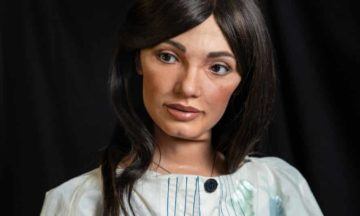Anne Enright in The Guardian:
 Klara and the Sun asks readers to love a robot and, the funny thing is, we do. This is a novel not just about a machine but narrated by a machine, though the word is not used about her until late in the book when it is wielded by a stranger as an insult. People distrust and then start to like her: “Are you alright, Klara?” Apart from the occasional lapse into bullying or indifference, humans are solicitous of Klara’s feelings – if that is what they are. Klara is built to observe and understand humans, and these actions are so close to empathy they may amount to the same thing. “I believe I have many feelings,” she says. “The more I observe the more feelings become available to me.” Klara is an AF, or artificial friend, who is bought as a companion for 14-year-old Josie, a girl suffering from a mysterious, perhaps terminal illness. Klara is loyal and tactful, she is able to absorb difficulty and return care. Her role, as she describes it, is to prevent loneliness and to serve.
Klara and the Sun asks readers to love a robot and, the funny thing is, we do. This is a novel not just about a machine but narrated by a machine, though the word is not used about her until late in the book when it is wielded by a stranger as an insult. People distrust and then start to like her: “Are you alright, Klara?” Apart from the occasional lapse into bullying or indifference, humans are solicitous of Klara’s feelings – if that is what they are. Klara is built to observe and understand humans, and these actions are so close to empathy they may amount to the same thing. “I believe I have many feelings,” she says. “The more I observe the more feelings become available to me.” Klara is an AF, or artificial friend, who is bought as a companion for 14-year-old Josie, a girl suffering from a mysterious, perhaps terminal illness. Klara is loyal and tactful, she is able to absorb difficulty and return care. Her role, as she describes it, is to prevent loneliness and to serve.
…There is something so steady and beautiful about the way Klara is always approaching connection, like a Zeno’s arrow of the heart. People will absolutely love this book, in part because it enacts the way we learn how to love. Klara and the Sun is wise like a child who decides, just for a little while, to love their doll. “What can children know about genuine love?” Klara asks. The answer, of course, is everything.
More here.
